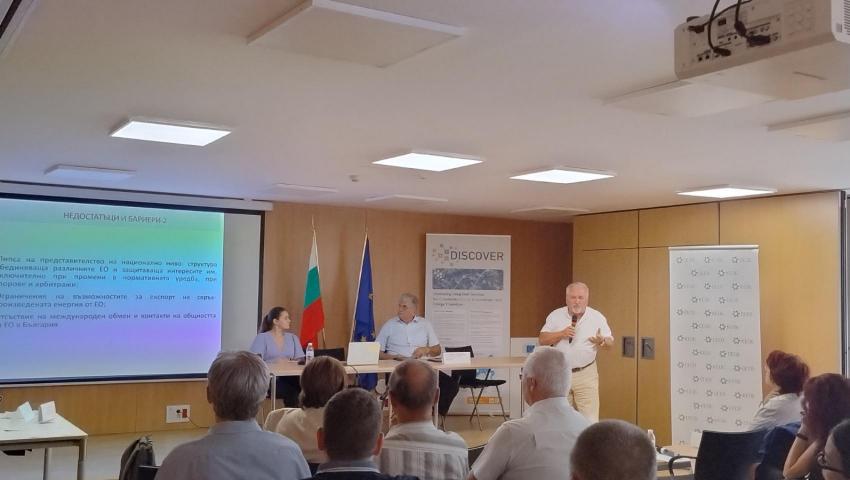Iva Petrova: With appropriate regulatory incentives, the energy communities in our country can develop
Energy communities have been developing rapidly in Europe in recent years, but they need to have the support and the necessary regulations

Energy communities have proven to be innovative structures that support the overall energy transition. This was said by the Deputy Minister of Energy, Iva Petrova, during a discussion forum on the topic "European decarbonization policy and the role of energy communities in Bulgaria: technologies, barriers and solutions", which is being held today at the House of Europe in Sofia. She reminded BTA that the Ministry of Energy has put a lot of effort into developing a draft Integrated Plan "Energy and Climate", where a higher ambition is set for achieving community goals for the utilization of renewable energy sources and achieving energy savings.
The Acting Deputy Minister of Energy added that the Department of Energy has proposed and passed recent changes to the Energy Act and the Renewable Energy Act, which regulate civil energy communities as well as renewable energy. "From the experience of other member states, we see that the availability of appropriate regulatory incentives is critically important for the creation and effective operation of energy communities," emphasized Iva Petrova.
After the changes in the two laws were adopted, the Agency for Sustainable Energy Development (ASED) has made assessments of the obstacles and the potential for energy communities from renewable energy in our country. The main findings relate to the obstacles and the need to facilitate access to finance. "Energy communities play a key role in the energy transformation process," said Iva Petrova. She drew attention to the fact that in Europe, the boom in energy communities is precisely related to basic solutions for energy transformation. The official deputy minister gave as an example that in Germany the "boom" of energy communities was towards 2010, when the decisions about nuclear energy, about the green transition, etc. began to be made. In Denmark it is a little earlier, and there it is also related to the energy transformation process. This boom in energy communities is accompanied by an appropriate regulatory framework and incentives for them. At the moment when the incentives given to energy communities are no longer in effect, there is a tendency to decrease the number of newly registered communities and a reaction of the existing ones, commented the acting Deputy Minister of Energy Iva Petrova.
Energy community = sharing
The key to the energy community is sharing. This was said by Tsvetelina Kulevska from the Agency for Energy Sustainable Development (ASED), who took part in the forum on energy communities and their opportunities. According to her, the energy should be shared within the community of the installations that produce it, respecting the rights and obligations of the members as consumers.
Kulevska pointed out that it is very important that financial profits, if they exist, are not the goal of the energy communities. ASED has assessed the obstacles facing energy communities. It is important to know if there is a founding document, who the members are, as well as whether these communities are within an urbanized area and what the energy production facilities are. In addition, one must know who is responsible for this community and whether it is equal among its members. It must also be ensured that financial gains are not the goal of this community. Creating and operating such communities requires considerable technical and legal expertise, which is sometimes a problem. It is also very important that the one-stop service centers function well, Kulevska pointed out.
She pointed out that currently 0.33 percent of the population of the European Union are united in energy cooperatives, which is small. Therefore, the EU tries to stimulate this process through appropriate regulations. There are prospects for the development of energy communities in Bulgaria, Kulevska believes. According to her, the main driving force should be the municipal administrations, because they are the owners of roofs where solar panels can be placed. They can also provide this awareness to the local community. An example of this is that one of the first energy communities was established in Gabrovo. At the beginning of June, a pilot project of an energy community was announced in the Municipality of Burgas, which was the first to be structured.
There needs to be a common registry of the energy communities in our country
The time has now come to have a common registry of energy communities. This was stated by Elenko Bozhkov, former deputy minister and the executive director of the Chamber of Energy Communities in Bulgaria (CECB). According to the expert, it is important to have a national body or institution, as is the case in Germany, where there is an Agency for Energy Communities.
Another obstacle facing the energy communities in Bulgaria is the lack of digitization of low and medium voltage networks, commented Bozhkov. In addition, saving and reducing network services should be a state policy in order to encourage energy communities, he believes.
The energy community should be one of the pillars of the energy industry, the executive director of the Chamber of Energy Communities in Bulgaria (CECB) Elenko Bozhkov pointed out. According to him, the money for compensating companies due to high electricity prices can be used in a different way - the funds are not used to compensate businesses, but to build their own RES capacities. The same model can be applied to the energy poor.
